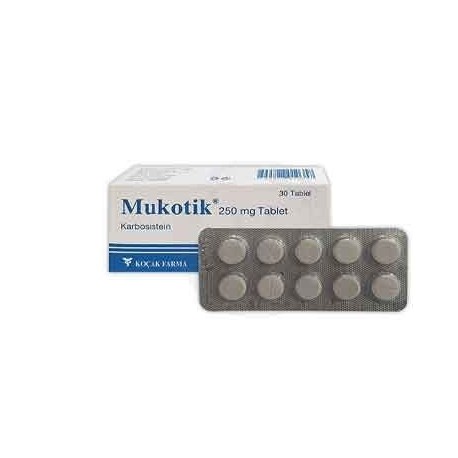 View larger
View larger Mukotik Carbocisteine (mucodyne) 250 Mg 50 Tablets
MKTK6627
New product
BUY MORE PAY LESS
| Quantity | Discount | |
|---|---|---|
| 2 | 5% | |
| 3 | 10% | |
| 4 | 15% | |
| 5 | 20% |
Volume discounts
| Quantity | Discount | You Save |
|---|---|---|
| 2 | 5% | Up to $2.90 |
| 3 | 10% | Up to $8.70 |
| 4 | 15% | Up to $17.40 |
| 5 | 20% | Up to $29.00 |
More info
Active ingredient
Carbocisteine 250 mg
Excipients
Lactose monohydrate (from bovine) 80 mg
4. CLINICAL FEATURES
4.1. Therapeutic indications
It is used as an adjunctive therapy in acute and chronic respiratory tract diseases characterized by excessive mucus formation and in secretory otitis media.
4.2. Posology and method of administration
Posology / application frequency and duration:
In adults, including the elderly:
Dosage is based on an initial daily dose of 2250mg Carbocysteine in divided doses; When a satisfactory effect is achieved, it is reduced to 1500 mg per day in divided doses, for example from 3 tablets three times a day to 2 tablets three times a day.
Method of Application:
It is taken orally.
Additional information on special populations:
Kidney / Liver failure:
The above mentioned doses are used.
Pediatric population:
In children:
This formulation is not recommended for children. The usual daily dose is 20 mg / kg body weight in divided doses. For this, it is recommended to use Mucotic Pediatric Syrup.
Geriatric population:
The dosage stated above is used.
4.3. Contraindications
It should not be used in those who are hypersensitive to the active substance or the excipients in its composition.
It should not be used in patients with active gastric and duodenal ulcers.
4.4. Special use warnings and precautions
During the use of the drug in normal doses, there may be an increase in the amount of expectorated sputum. If there is excessive obstruction in the lungs and respiratory tract, if the cough required to expel the mucus particles is not sufficient, the obstruction in the respiratory tract can be eliminated by mechanical aspiration.
Since bronchospasm may occur during the treatment of asthmatic patients, it should be given with caution. It should not be used if symptoms are seen.
Caution is advised in the elderly, those with a history of gastroduodenal ulcer, or those with drugs known to cause gastrointestinal bleeding. If gastrointestinal bleeding occurs, patients should discontinue the drug.
MUCOTIC contains lactose (originating from bovine). Patients with rare hereditary problems of galactose intolerance, the Lapp lactase deficiency or glucose-galactose malabsorption should not take this medicine.
4.5. Interaction with other medicinal products and other forms of interaction
It is incompatible with Folkodin. Its mixture with folcodine causes carbocysteine to precipitate. It is recommended not to use the opiate derivative at the same time as these types of compounds.
4.6. Pregnancy and lactation
General advice
Pregnancy category: B
Women with childbearing potential / Contraception (Contraception)
The effects of carbocysteine on women of childbearing potential and contraception are unknown.
Gestation period
For mucotic, no clinical data on exposure to pregnancies are available. Animal studies do not indicate harmful effects with respect to pregnancy / embryonal / fetal development / birth or postnatal development, or indirectly.
Caution should be exercised when administered to pregnant women.
Although there is no teratogenic effect in the experiments, it is recommended not to be used in the first trimester of pregnancy.
Lactation period
It is not known whether the mother's milk. Since many drugs pass into breast milk, care should be taken when administering the Mucotic tablet to a nursing mother.
Reproductive ability / Fertility
Effects on fertility and fertility are unknown.
4.7. Effects on ability to drive and use machines
There is no information on this matter.
4.8. Unwanted effects
Frequencies are defined as follows: Very common (> 1/10); common (> 1/100, <1/10); uncommon (> 1/1000, <1/100); rare (> 1 / 10,000, <1/1000); very rare (<1 / 10,000); unknown (cannot be estimated from the available data).
Immune system disorders
Not known: Anaphylactic reactions and pronounced drug eruption
Nervous system disorders
Not known: headache
Gastrointestinal diseases
Rare: Gastrointestinal bleeding.
Not known: Nausea, vomiting, haemoptysis, stomach discomfort, diarrhea

